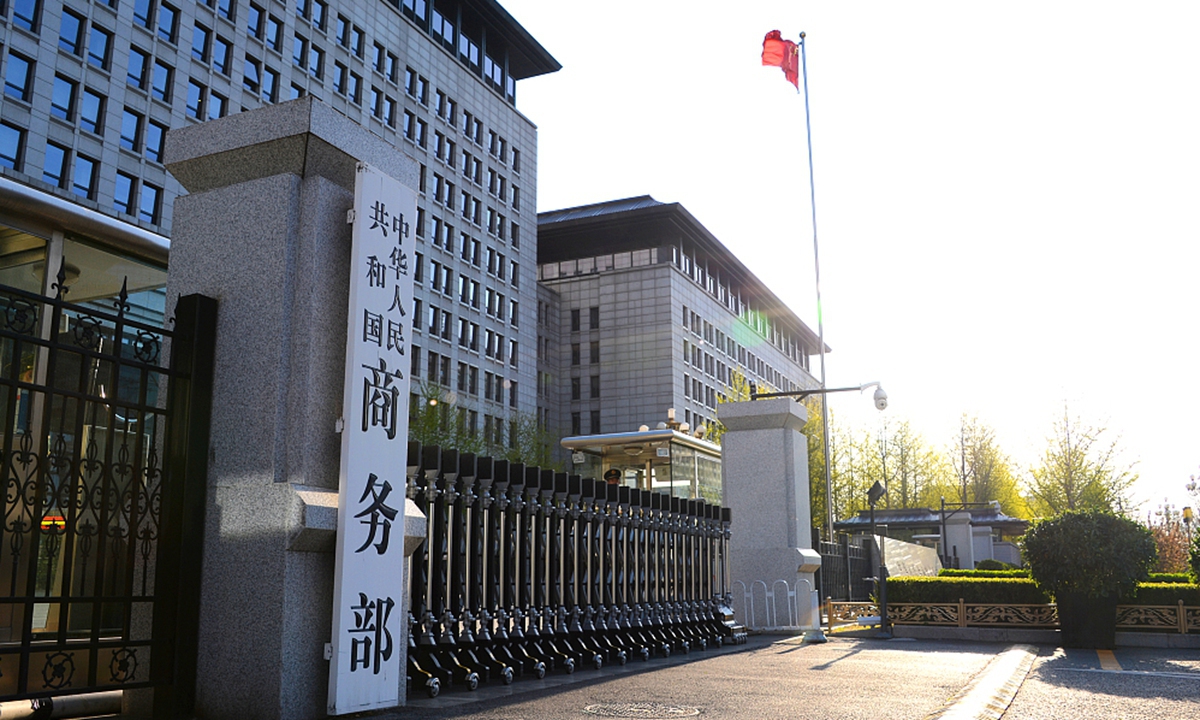
The Ministry of Commerce Photo: VCG
China has lodged a World Trade Organization (WTO) dispute complaint over discriminatory subsidies on new-energy vehicles (NEVs) under the US Inflation Reduction Act (IRA), a Chinese Ministry of Commerce (MOFCOM) spokesperson said on Tuesday.
The US government, under the pretext of tackling climate challenges and pursuing low-carbon development, has detailed in its IRA requirements for products eligible for its subsidies to be produced in certain regions, including domestically within the US.
Chinese experts said that China's response, with the aim of maintaining the interests of Chinese NEV companies as well as a fair competitive environment for the global NEV industry, is reasonable, legitimate and well-founded. They urged the US to abide by the rules of the WTO and stop practicing trade protectionism.
The US action has violated the WTO's rules such as national treatment and most favored nation treatment, and China firmly opposes the discriminatory act, the MOFCOM spokesperson said, adding that the US measures have seriously disrupted global NEV industry and supply chains.
The ministry noted that China firmly stands for the rules-based multilateral trading system and respects the legitimate rights of WTO members to implement industry subsidies within the framework of WTO rules and promote their own economic and social development.
"We urge the US to abide by WTO rules, respect the development trend of the global NEV industry, promptly correct its discriminatory industrial policies and maintain the stability of the global NEV industry and supply chains," the spokesperson said.
US measures constitute trade protectionism measures against China, experts said.
The dispute complaint came as the EU is launching an investigation targeting Chinese NEVs.
Commenting on the dispute complaint, Cui Dongshu, secretary-general of the China Passenger Car Association, told the Global Times on Tuesday that "it is in accordance with the rules of world trade, reasonable and legal, and helps Chinese enterprises achieve equal status in the US market and EU market."
China's response showcases its commitment to multilateralism, upholding the authority of the WTO, and appealing to the rules of the WTO is a reasonable and legitimate choice, Sang Baichuan, dean of the Institute of International Economy at the University of International Business and Economics, told the Global Times on Tuesday.
Such a discriminatory act has distorted fair competition, and China is not the only country that has signaled deep concern over the bill, Huo Jianguo, a vice chairman of the China Society for World Trade Organization Studies in Beijing, told the Global Times on Tuesday, adding that the IRA has faced severe criticism by European allies of the US.
The $430 billion bill imposed by the Biden administration sparked a severe trans-Atlantic dispute, and that might have consequences not only for bilateral trade relations and a possible diversion of direct foreign investment, but also on the possible re-shaping of EU policies, according to a paper published by the EU Parliament on its website on June 2, 2023.
"The complaint is a strong message to the US. Chances are high that the Chinese side will win, as the IRA's provisions do violate the WTO rules from a legal perspective," Huo said.
Experts said that the significant growth in NEV exports is posing a challenge to the traditional automotive industry in the US.
The so-called threat from China is actually baseless, and the truth is that the bill does not help address inflation in the US but serves attempts by the US to hinder China's industrial restructuring and upgrading, Sang said.
Chinese officials and analysts publicly expressed concerns about the unfair and discriminatory measures taken by the US side when it passed the IRA in August 2022, and it has been opposed by US carmakers.
The EV industrial chains in the US and Europe are not as strong as in China, and Washington is using the IRA to check China's development in a preemptive move, experts noted.
China takes the lead in the development of NEVs. In 2023, China's NEV production exceeded 9.58 million units, up 35.8 percent year-on-year. Sales hit 9.49 million units, up 37.9 percent year on year, while exports soared 77.6 percent to more than 1.2 million, according to the China Association of Automobile Manufacturers (CAAM).
In the first two months of 2024, production of NEVs reached 1.252 million units, up 28.2 percent, and sales reached 1.207 million, up 29.4 percent, according to the CAAM.
China is
ramping up support for the development of NEVs and accelerating technology innovation to consolidate the industry's advantage.




